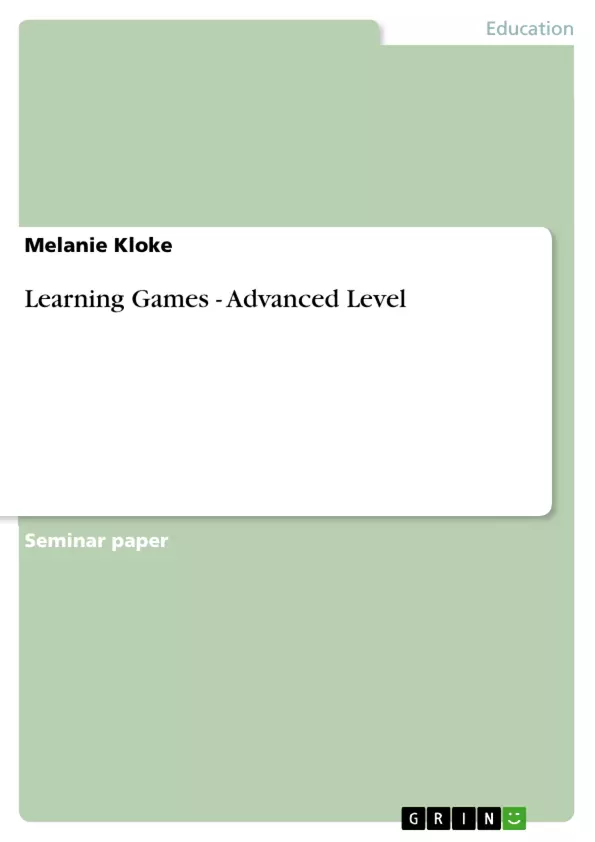Learning a foreign language is always based on developing, improving and practising the four basic skills reading, speaking, listening and writing. Therefore, pupils have to imitate their teacher and repeat certain given patterns again and again to learn and get used to the spelling and pronunciation of the target language. This can, if always done in the same way, cause monotony and boredom among the learners and can lead to a low motivation. To avoid this development, teachers should try to involve as much activity and variations as possible to make the lessons more lively. Using games in the classroom can support the vitality of the learning process a lot and can help to motivate the pupils. They can be a good alternative to repetition drills or teacher centred lessons and can not only be helpful for teaching beginners a foreign language, but also to make lessons of advanced learners more varied. But, of course, a lot of facts have to be borne in mind and to be considered when games shall be integrated in the lesson. The following implementations will contain information about what games actually are, why they should be used and what is important to be aware of if they are used. Furthermore, the type of learning games and their advantages for advanced learners will be discussed. Finally, examples for learning games in advanced groups will be given and explained.
Inhaltsverzeichnis (Table of Contents)
- Introduction
- Definition of Games
- Different Types of Games
- Advantages of Games
- What to Bear in Mind?
- Learning Games
- Advantages of Learning Games for Advanced Learners
- Examples of Learning Games in Advanced Groups
- Crossword puzzles
- Proverbs, Similes and Collocations
- Split Proverbs / Similes
- Multiple Choice
- Collocations
- Matching games
- Guess who you are
- Biographies
- Market Research
- Balloon Game
- Conclusion
Zielsetzung und Themenschwerpunkte (Objectives and Key Themes)
The main objective of this paper is to explore the use of games in the foreign language classroom, particularly for advanced learners. It aims to illustrate the benefits of integrating games into lessons and provide practical examples of learning games that can be utilized in advanced groups.
- The nature and definition of games
- Different types of games and their suitability for language learning
- The advantages of using games in the classroom
- Specific learning games for advanced learners
- Considerations for successful game implementation
Zusammenfassung der Kapitel (Chapter Summaries)
- Introduction: This chapter introduces the concept of language games in the foreign language classroom, highlighting the need for engaging and varied activities to combat monotony and enhance motivation. It establishes the relevance of games for both beginners and advanced learners.
- Definition of Games: This chapter explores the definition of games, differentiating them from work and play. It highlights key characteristics of games, such as their non-utility beyond the player, their inherent pleasantness, and their capacity for trial and error.
- Different Types of Games: This chapter categorizes games based on the language skills they target, such as oral games for speaking and understanding, reading and writing games, and pronunciation games. It emphasizes the importance of integrating different game types for comprehensive language development.
- Advantages of Games: This chapter delves into the benefits of using games in the language classroom, arguing that games can enhance motivation, create a more stimulating learning environment, and improve various language skills.
- What to Bear in Mind?: This chapter discusses practical considerations for successful game implementation, emphasizing the need for clear aims and structure, appropriate game selection, and careful management of the learning process.
- Learning Games: This chapter explores the specific nature of learning games, their unique benefits, and how they can be utilized in the foreign language classroom.
- Advantages of Learning Games for Advanced Learners: This chapter focuses on the specific advantages of using learning games with advanced learners, highlighting their ability to enhance vocabulary, fluency, grammar, and cultural understanding.
Schlüsselwörter (Keywords)
This paper focuses on the use of games in the foreign language classroom, particularly for advanced learners. Key terms and concepts explored include: language games, learning games, foreign language teaching, advanced learners, motivation, language skills, pronunciation, vocabulary, fluency, grammar, and cultural understanding.
Frequently Asked Questions
Why should games be used in advanced language learning?
Games prevent monotony and boredom, increase student motivation, and provide a lively alternative to repetitive drills and teacher-centered lessons.
What are some examples of learning games for advanced groups?
Examples include crossword puzzles, matching proverbs/similes, "Guess who you are," and the "Balloon Game."
How do games help with vocabulary and cultural understanding?
Learning games like "Split Proverbs" or "Market Research" expose advanced learners to idiomatic expressions and cultural contexts in an engaging, trial-and-error environment.
What is the difference between "work," "play," and "games"?
Games are characterized by their inherent pleasantness, non-utility beyond the player, and a structured environment that allows for experimentation.
What should teachers bear in mind when implementing games?
Teachers must ensure clear educational aims, appropriate game selection for the level, and careful management of the classroom process.
- Citar trabajo
- Melanie Kloke (Autor), 2005, Learning Games - Advanced Level, Múnich, GRIN Verlag, https://www.grin.com/document/53166



